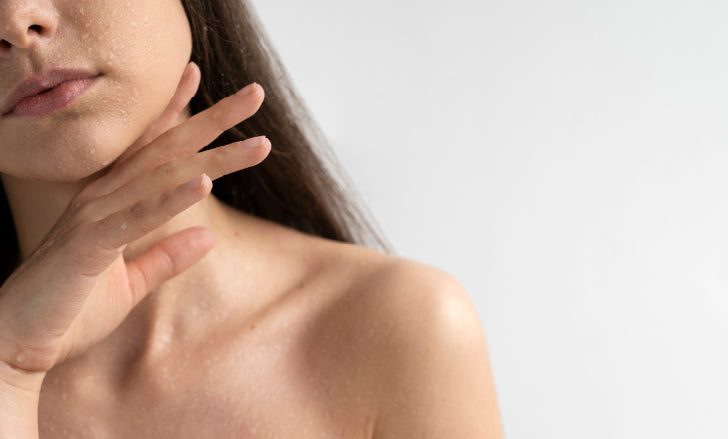The Science of Skin Dehydration: How to Tell If Your Skin is Dehydrated and What to Do About It

Introduction
Healthy skin relies on adequate hydration to maintain its elasticity, resilience, and protective function. However, dehydration—a temporary state of insufficient water levels in the skin—can compromise its barrier, leading to dullness, roughness, and increased sensitivity. It is important to distinguish between hydrated vs. dehydrated skin, as dehydration is a condition that affects all skin types, including oily skin. Unlike dry skin, which lacks oil due to lower sebum production, dehydrated skin lacks water, making it appear tight, flaky, and prone to irritation. Understanding the science behind skin hydration can help identify dehydration early and take the right steps to restore skin health.
The Science of Skin Hydration
Skin hydration is maintained through multiple structural and physiological processes like:
-
Stratum Corneum Barrier Function: The outermost layer of the skin (stratum corneum) acts as a water-retaining shield, preventing excessive moisture loss.
-
Natural Moisturizing Factors (NMFs): Compounds like amino acids, lactic acid, and urea attract and retain water within the skin.
-
Lipid Barrier: Composed of ceramides, fatty acids, and cholesterol, the lipid layer locks in moisture and prevents transepidermal water loss (TEWL).
-
Aquaporins: These are water channels in the cell membranes that regulate the movement of water in and out of skin cells, ensuring optimal hydration levels.
When these mechanisms are disrupted, the skin loses water faster than it can be replenished, leading to dehydration.
Factors Affecting Skin Hydration
Several external and internal factors influence skin hydration such as:
-
Environmental Factors: Cold weather, low humidity, excessive sun exposure, exposure to UV rays, and harsh skincare products strip moisture from the skin.
-
Nutritional Factors: Inadequate water intake, excessive caffeine or alcohol consumption, and a lack of essential fatty acids can lead to dehydration.
-
Lifestyle Habits: Skincare, exercise habits, and awareness regarding adequate skincare also affect hydration levels in the skin.
-
Aging: As we age, the skin’s ability to retain moisture decreases due to a decline in NMF production, lipid content, and collagen levels.
Factors That Enhance and Diminish Skin Hydration Levels
-
Enhancing Hydration:
o Use humectants like hyaluronic acid and glycerine to attract moisture.
o Apply occlusives such as ceramides and shea butter to seal in hydration.
o Drink sufficient water and consume hydrating foods rich in omega-3s and antioxidants.
o Probiotics, vitamin C, and collagen may improve skin hydration by producing ceramides
o Use gentle, non-stripping cleansers to maintain the skin’s natural barrier.
-
Diminishing Hydration:
o Over-exfoliation and harsh cleansers strip the skin of essential moisture.
o Air conditioning and heating systems contribute to indoor dryness.
o Hot showers and prolonged sun exposure increase water loss.
Diseases Where Skin Dehydration Is Common
Certain medical conditions predispose individuals to skin dehydration:
-
Eczema (Atopic Dermatitis): A compromised skin barrier leads to increased TEWL.
-
Psoriasis: Thickened, scaly plaques result in reduced moisture retention.
-
Xerotic dermatitis: Also known as asteatotic eczema, this condition is characterised by extremely dry, cracked, and itchy skin, often worsened in colder months due to reduced humidity.
-
Hand Dermatitis: Frequent handwashing, exposure to irritants, and underlying conditions lead to moisture loss, causing dry, rough, and inflamed skin on the hands.
Caring for Dry and Dehydrated Skin
Dry and dehydrated skin can exacerbate post-inflammatory hyperpigmentation (PIH) by impairing the skin’s natural healing process. To maintain a healthy skin barrier and promote even-toned skin, consider the following tips:
- Hydrate your body and skin with plenty of water.
- Use a gentle, hydrating, non-comedogenic cleansers to prevent stripping natural oils.
- Moisturize with ceramides, hyaluronic acid, glycerine, and shea butter to strengthen the skin barrier. Prefer to apply moisturizer immediately after shower or washing your skin.
- Apply a lip balm or petroleum jelly to your lips to prevent dryness.
- Say no to harmful irritants such as alcohol and deodorant soaps for your skin.
- Wear SPF 30+ sunscreen daily to prevent worsening PIH.
- Avoid over-exfoliating, as it can dry out and irritate the skin.
- Avoid hot showers that strip natural oils and worsen dryness.
- Choose a soothing, barrier-repairing night cream for overnight hydration.
Skin dehydration is a reversible condition, but addressing it requires a combination of proper skin care, adequate hydration, and lifestyle modifications. Identifying dehydration early and restoring moisture through targeted ingredients and dietary improvements can help maintain a healthy, radiant complexion. If persistent dehydration occurs despite adequate care, consulting a dermatologist is recommended to rule out underlying health conditions.
